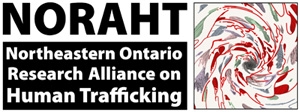Human trafficking research findings released

North Bay, ON - After seven years of collaboration, the Northeastern Ontario Research Alliance on Human Trafficking (NORAHT) has concluded its research on the gaps and barriers to regional services for women experiencing exploitation, violence or abuse in the sex industry.
Funded by the Social Sciences and Humanities Research Council of Canada, NORAHT’s research has resulted in the development of five policy briefs highlighting key recommendations with regard to:
- Strategies for Service Provider Collaboration;
- Trauma and Violence-Informed Approaches to Service Provision;
- Decolonizing our Actions;
- Safer Spaces and Harm Reduction; and
- The Impacts of Anti-Human Trafficking on Sex Workers.
NORAHT is comprised of representatives from Nipissing University, the Union of Ontario Indians: Anishinabek Nation, Victim Services of Nipissing District, and Centered Fire Counselling and Consulting. Past partners include the AIDS Committee of North Bay and Area and Amelia Rising Sexual Assault Center of Nipissing.
“This has been a tremendous journey and we would like to thank everyone who participated in this research,” said Rosemary Nagy, NORAHT Co-Director and Associate Professor, Nipissing University. “One key lesson we learned through this research was the need to provide services to everyone involved in the sex industry who asks for support, regardless of how they identify their experience.”
Among other findings, the group has produced a report titled “Transitions and Fluidities: Exploring Women’s Agency in the Sex Industry”, that centers on the voices of women with lived experience in sex work and/or human trafficking. It has also compiled a Trauma and Violence-Informed Training Toolkit for service providers.
“The prevention of human trafficking requires so much more than awareness campaigns,” said Co-Director Brenda Quenneville, Centered Fire Counselling and Consulting. “Our research highlights the importance of dismantling ongoing colonialism and institutionalized racism, reforming the laws around human trafficking and sex work, and tackling poverty and the lack of safer and affordable housing in the region.”
As NORAHT’s work winds down, the Nipissing Human Trafficking Knowledge Network (NHKTN), a newly created community table for service providers, will continue gathering important information and research in this field. For further information about NHTKN, please contact Kathleen Jodouin, Executive Director, Victim Services of Nipissing District at ed@vianet.ca or 705-472-2649.
Research findings including webinars, academic articles, and older reports can be found at https://noraht.nipissingu.ca/.
-30-
Note: See infographic below for summary of findings and recommendations
Contact:
Meghan Venasse
Manager, Communications
Nipissing University
705-474-3450 ext. 4615
meghanv@nipissingu.ca

